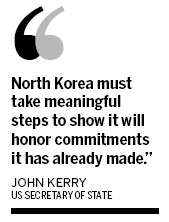Kerry says talks possible if Pyongyang works for peace

US Secretary of State John Kerry said on Monday that Washington will talk with Pyongyang if it takes "meaningful steps" toward peace, as he ended a trip to the region dominated by concerns about Pyongyang's nuclear and missile programs.
"The United States remains open to authentic and credible negotiations on denuclearization, but the burden is on Pyongyang," said Kerry, speaking in Japan on the last leg of an Asian tour that included stops in China and the Republic of Korea.
"North Korea must take meaningful steps to show it will honor commitments it has already made."
The nuclear missile program of the Democratic People's Republic of Korea threatens not only the DPRK's neighbors, but also its own people, Kerry said.
Kerry also met with Japan's Prime Minister Shinzo Abe on Monday, and both Washington and Tokyo urged Pyongyang not to launch a missile.
Kerry continued to take a mild tone toward the DPRK in Japan, and his East Asia trip is a turning point for the situation on the Korean Peninsula, said Wang Junsheng, a researcher on East Asian studies with the Chinese Academy of Social Sciences.
Kerry's comments showed the US doesn't want the situation on the peninsula to spiral out of control, and it has the willingness to communicate with Pyongyang, Wang said. After receiving this message from the US, the DPRK will also show more restraint, he added.
Kerry's visit offers an opportunity to ease tensions on the Korean Peninsula, Wang said.
But Shi Yinhong, a professor on international affairs at Remin University of China, said there are still differences in views among relevant parties.
The Korean Peninsula has been in a state of heightened military tension since the DPRK carried out its third nuclear test in February.
Incensed by fresh United Nations sanctions and joint ROK-US military exercises, Pyongyang has spent weeks issuing blistering threats of missile strikes and nuclear war.
Six-Party Talks
Washington insists that the Six-Party Talks on denuclearization is the only forum at which it will sit with Pyongyang.
While in Asia, Kerry has talked tough on the DPRK's "unacceptable" rhetoric, but also sought to lower the temperature by supporting dialogue with Pyongyang and saying he would be "prepared to reach out" to the DPRK.
In Seoul, he gave Washington's public blessing to peace overtures made by ROK's new president, Park Geun-hye, who in recent days has signaled the need to open a dialogue and "listen to what North Korea thinks".
But the DPRK rejected the overtures as "empty talk" and a "crafty trick" to conceal Seoul's aggressive intentions.
"It is very regrettable that the North dismissed our offer," the ROK Unification Ministry said on Monday, labeling Pyongyang's response "totally incomprehensible".
The DPRK's current leader and Kim Il-sung's grandson, Kim Jong-un, opened Monday's birthday events with a visit to the mausoleum in Pyongyang housing the embalmed bodies of his grandfather and his father Kim Jong-il.
ROK and US forces have been on a heightened state of alert for days, and Japan has deployed Patriot anti-missile systems around Tokyo and promised to shoot down any missile deemed to be a threat.
Following Pyongyang's repeated threats to attack the US and its allies, the US has beefed up its military presence in the Asia-Pacific region in recent weeks, deploying two missile defense systems.
During his trip in Japan, Kerry also defended the re-orientation of US foreign policy toward Asia, trying to assuage China's concerns even as he offered reassurance to US allies such as Japan and the ROK that it wasn't going anywhere.
"Some people might be skeptical of America's commitment to this region," Kerry told students at the Tokyo Institute of Technology. "My commitment to you is that as a Pacific nation that takes our Pacific partnership seriously, we will continue to build on our active and enduring presence."
China Daily-AFP-Reuters
Zhou Wa contributed to this story.
(China Daily 04/16/2013 page11)








